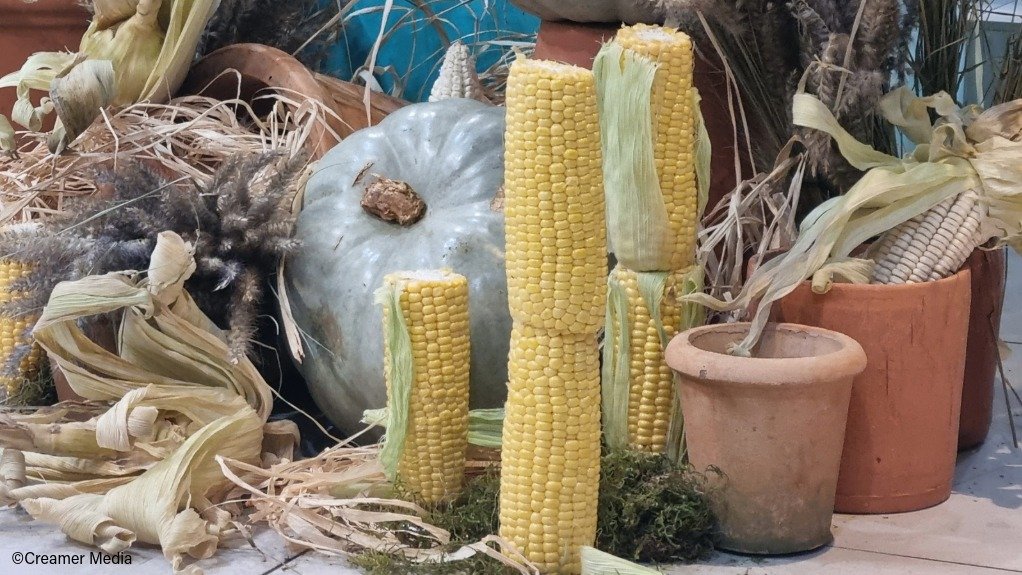B20 Agri Task Force calls for coordinated action to unlock Africa’s ‘food basket to the world’ potential
The B20 Sustainable Food Systems and Agriculture Task Force has emphasised the urgency needed to strengthen Africa’s food system by 2030, particularly as the continent will need to feed an additional 200-million people by 2030 amid a widening investment gap.
It is estimated that eight-million hectares of additional crop land will be needed by 2030 globally, which can be provided by Africa to a large extent.
Pharmaceutical and biotechnology company Bayer crop science head for Africa Debra Mallowah said unlocking investment of this scale would require coordinated action rather than isolated efforts.
She spoke during a B20 discussion hosted on November 21, which was hosted by Bayer, as the chairperson of the agriculture task force, financial institution FNB, agriculture innovation scaling company AGRA and continental governmental organisation the African Union.
Mallowah stressed the importance of predictability and reliability for farmers, who often experience practical challenges with lacking infrastructure and climate change impacts.
She also mentioned that the B20 task force recommendations had been pragmatic and actionable, with a focus on high-impact solutions that could enhance food security through trade, resilient supply chains and sustainable agriculture.
The B20 Food Systems and Agriculture Task Force’s recommendations are focused on increasing intra-Africa trade, which could generate $180-billion in additional agriculture exports and scaling sustainable infrastructure.
Additionally, by investing in regional processing capacity, cold chains, warehousing, rural transport and cross-border logistics, it can build resilient regional supply chains and increase regional GDP by 2%, while improving the livelihoods of 13-million people.
Mallowah underscored the need for more private-sector investment in agriculture, as well as intentional government leadership and community partnerships to achieve these goals.
She deemed it necessary to support both commercial and smallholder farmers to grow more food and regenerate the ecosystems that support their productivity, as sustainable agriculture is an economic imperative, an environmental necessity and the foundation for long-term food security.
Mallowah mentioned that instead of trying to achieve agricultural success by supporting large-scale commercial farming, stakeholders should focus on investing in the smallholder systems that are already feeding the continent. “The focus should be on investing in smallholder systems rather than replacing them with commercial farms.”
Smallholder farmers are often the ones facing challenges of deteriorating rural roads, cold chain constraints and unpredictable markets, yet 70% of Africa’s food supply is produced by smallholder farmers, mostly women.
Mallowah envisioned a future where women could more easily access credit, adopt technology and withstand climate shocks.
This kind of transformation at scale was impossible, however, without private sector investment and was unsustainable without government and community leadership, she stated.
Mallowah pointed out the risks of inaction as being food price volatility, increased dependence on imports and climate change disruptions.
“The decade must be defined by partnerships and non-fragmented implementation, moving from declarations to action.
“Africa has the potential to achieve in four harvest cycles what took decades before if alignment and decisive action are taken,” Mallowah concluded.
GLOBAL CONTEXT
As the world turned its focus to Africa’s development priorities during various B20 and G20 gatherings in the last few days, AU Development Agency agriculture adviser Ildephonse Musafiri pointed out that global efforts would be needed to grow Africa’s agriculture sector, as 65% of the world’s remaining arable land lay on the continent.
By focusing on agriculture expansion, Musafiri said Africa could generate an additional $80-billion in revenue every year and create ten-million jobs within a decade.
This will require, however, boosting labour and capital productivity, innovating in digital agriculture, enhancing resilience to climate change, improving trade integration on the continent and securing finance.
The African Union has often called for global partnerships to support young and women farmers to transform Africa to a major contributor to global food security, including through the Comprehensive Africa Agriculture Development Programme (CAADP).
Musafiri elaborated that agriculture accounted for 50% of Africa’s employment yet contributed only 20% of the continent’s GDP – which showed the need for productivity improvements.
He believes that innovation in digital agriculture, including AI and the use of drones, can reduce input costs and increase yields.
“Resilient food systems require soil health restoration, climate-smart infrastructure and economic development,” Musafiri added.
He further emphasised the importance of harmonising trade standards and regulations to facilitate intra-Africa trade.
According to Musafiri, Africa was ready for innovative public-private partnerships and called on global stakeholders to support the CAADP to scale agriculture solutions across the continent.
Article Enquiry
Email Article
Save Article
Feedback
To advertise email advertising@creamermedia.co.za or click here
Press Office
Announcements
What's On
Subscribe to improve your user experience...
Option 1 (equivalent of R125 a month):
Receive a weekly copy of Creamer Media's Engineering News & Mining Weekly magazine
(print copy for those in South Africa and e-magazine for those outside of South Africa)
Receive daily email newsletters
Access to full search results
Access archive of magazine back copies
Access to Projects in Progress
Access to ONE Research Report of your choice in PDF format
Option 2 (equivalent of R375 a month):
All benefits from Option 1
PLUS
Access to Creamer Media's Research Channel Africa for ALL Research Reports, in PDF format, on various industrial and mining sectors
including Electricity; Water; Energy Transition; Hydrogen; Roads, Rail and Ports; Coal; Gold; Platinum; Battery Metals; etc.
Already a subscriber?
Forgotten your password?
Receive weekly copy of Creamer Media's Engineering News & Mining Weekly magazine (print copy for those in South Africa and e-magazine for those outside of South Africa)
➕
Recieve daily email newsletters
➕
Access to full search results
➕
Access archive of magazine back copies
➕
Access to Projects in Progress
➕
Access to ONE Research Report of your choice in PDF format
RESEARCH CHANNEL AFRICA
R4500 (equivalent of R375 a month)
SUBSCRIBEAll benefits from Option 1
➕
Access to Creamer Media's Research Channel Africa for ALL Research Reports on various industrial and mining sectors, in PDF format, including on:
Electricity
➕
Water
➕
Energy Transition
➕
Hydrogen
➕
Roads, Rail and Ports
➕
Coal
➕
Gold
➕
Platinum
➕
Battery Metals
➕
etc.
Receive all benefits from Option 1 or Option 2 delivered to numerous people at your company
➕
Multiple User names and Passwords for simultaneous log-ins
➕
Intranet integration access to all in your organisation





















